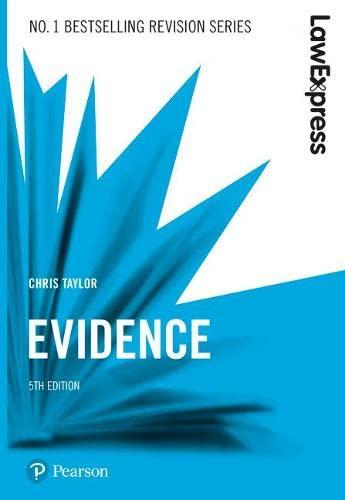Question
1. Generally, Title VII of the Civil Rights Act of 1964 applies to employers in interstate commerce who employ fifteen or more full- or part-time
1. Generally, Title VII of the Civil Rights Act of 1964 applies to employers in interstate commerce who employ fifteen or more full- or part-time employees year-round.
True
False
2.An employer must pay the employee during any leave taken under the Family and Medical Leave Act.
True
False
3.An employer cannot successfully argue that an employee's religion, sex, or national origin is a bona fide occupational qualification.
True
False
4.Title VII of the Civil Rights Act of 1967 prohibits employers, labor organizations, or employment agencies from engaging in employment discrimination based on color, race, religion, sex, or national origin.
True
False
5. The law that prohibits unfair labor practices by employers is
The Norris-LaGuardia Act.
The Wagner Act.
The Taft-Hartley Act.
The National Relations Labor Act.
6.The Civil Rights Act of 1964 forbids employment discrimination on the basis of
age.
political affiliation.
sexual orientation.
national origin.
all of the above.
7. In this landmark case, Supreme Court held that an employer could face liability for harassment that created a hostile or offensive working environment.
International Union UAW v. Johnson Controls, Inc.
Meritor v. Vinson
Griggs v. Duke Power Co.
Ledbetter v. Goodyear Tire & Rubber Co.
The case is not listed here
8.This is the case where the Supreme Court established the basic framework for disparate impact cases
International Union UAW v. Johnson Controls, Inc.
Meritor v. Vinson
Griggs v. Duke Power Co.
Ledbetter v. Goodyear Tire & Rubber Co.
The case is not listed here.
9.Teddy began working at BigCorp as a data analyst 5 years ago. Melat began working at BigCorp as a data analyst 6 years ago. They each have the same degrees from similarly situated universities and have the same amount of experience in this industry. Melat makes $10,000 more per year than Teddy. Is this an unlawful discrimination?
Yes, because it violates the Equal Pay Act.
Yes, because gender is a protected class.
No, because Melat has seniority.
No, because private employers can set the salaries of their employees.
10. An employer is not required to make accommodations for a protected class if such accommodations create a/an __________ _________.
Step by Step Solution
There are 3 Steps involved in it
Step: 1

Get Instant Access to Expert-Tailored Solutions
See step-by-step solutions with expert insights and AI powered tools for academic success
Step: 2

Step: 3

Ace Your Homework with AI
Get the answers you need in no time with our AI-driven, step-by-step assistance
Get Started


